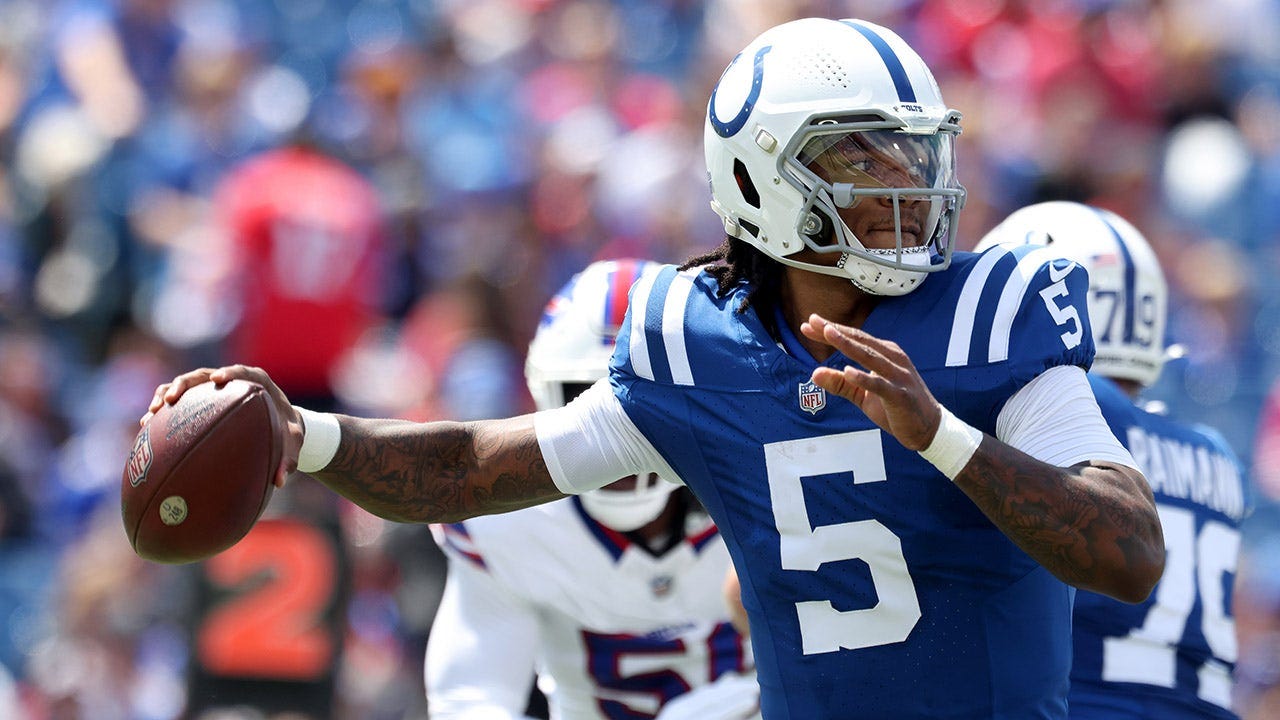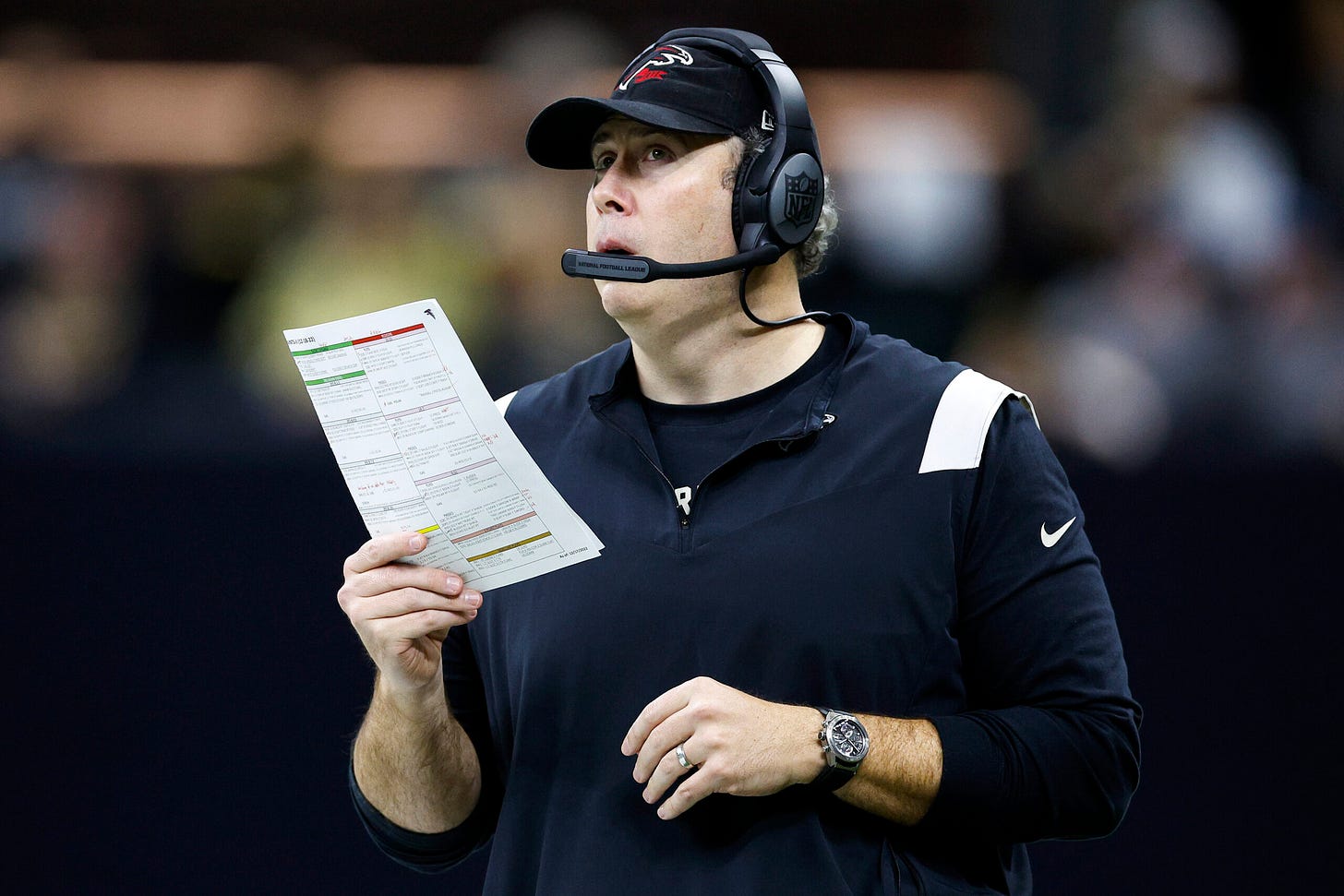Weekly Commentary & Review #7
How early should rookie quarterbacks start? Have Arthur Smith and Kyle Shanahan cracked the code of personnel diversity?
This post looks at the storylines of the week, whether relevant articles, analyses or other news from the week that provide useful insight to absorb, or missing context to add.
Earlier this week, the Colts named rookie Anthony Richardson as their Week 1 starter, joining Bryce Young as an early rookie starter and triggering another round of “when should this ‘raw’ quarterback start” discourse (still pending on C.J. Stroud). Despite the annoyance of hearing so many uninformed takes, I was glad to see this topic come back around, like it does every offseason. Hopefully, I can answer the question better here than anywhere else: Should rookie quarterbacks start or sit?
Most of the takes around the Colts’ decision pointed to a couple anecdotes for why Richardson should or shouldn’t start so early.
Yes, Aaron Rodgers is a top-10 quarterback of all-time after waiting until his fourth season to start, and Patrick Mahomes is on the GOAT trajectory after basically sitting his entire rookie season, outside of a meaningless Week 17. It’s hard to argue sitting hurt those two considering the subsequent results, but the NFL is also full of examples of quarterbacks starting immediately and finding great success, including the Unexpected Points choice for greatest ever, Peyton Manning.
The proper way to approach this to look at the historical data, but also recognize the tremendous amount of selection bias in when highly drafted quarterbacks end up starting. Outside of a franchises with few especially meddlesome owners, coaches make the decisions for when rookie quarterbacks will start, and they’re, overwhelming, concerned with immediate results over uncertain questions of multi-year development. The quarterback starting any given week is nearly always the one who the head coach thinks will give the team the greatest chance of winning, as job security depends mostly on the team’s current win-loss record, outside of a few coaches who have built up the credibility to endure a rebuild.
But the coaches’ assessment of rookie quarterbacks’ readiness doesn’t happen in a vacuum: there are unique and definitive alternatives they have to consider, namely the other quarterbacks on the roster. I’ll dig through the data, but also add the proper context into why quarterbacks who sat did, and how those without a great explanation (mostly sitting behind a winning veteran) are probably flashing warning signs.
I’m going to restrict this to first-round quarterback selections since 2010. Here are the high-level numbers:
17 of 39 (43.5%) first-round quarterbacks have started Week 1 of their rookie seasons
For top-10 picks, that ratio rises slightly to 13 of 26 (50%)
30 of 39 started by Week 5 of their rookie seasons (77%)
Only two didn’t start their entire rookie seasons: Jake Locker and Jordan Love
The first thing I think we can dismiss is the idea of raw rookie quarterbacks needing a redshirt year in the NFL. It just doesn’t happen, unless the rookie is sitting behind a high performing veteran quarterback (Rodgers behind Brett Favre, Love behind Rodgers, or even Mahomes behind Alex Smith playing at an MVP-adjacent level in 2017). Locker is the only highly drafted rookie to sit the entire year behind an average-performing quarterback (Matt Hasselbeck was 16th in EPA/play among quarterbacks with at least 300 dropbbacks). Even then, the Titans had good results without starting the rookie, finishing 9-7 and never falling to a losing record at any point after Week 1.
The only first-round picks who didn’t start until the second half of their rookie years and were playing on teams with losing record in the first half are Dwayne Haskins (didn’t start until the Washington Redskins were 1-7) and Jared Goff (Los Angeles Rams were 4-5). Haskins and Goff proved their coaches wise to make them sit as rookies, both registering bottom-10 efficiency seasons since 2010 (among 468 with 200-plus dropbacks). Even for a player like Tua Tagovailoa who didn’t start until Week 8 after the team’s bye, the previous starter Ryan Fitzpatrick was playing at an incredible level, ranking fifth in EPA/play in 2020.
We need to go further than simply appealing to authority though. Just because teams are starting rookies early, it doesn’t mean that they’re right. I don’t think the change over the years to starting rookies soon than later is an artificial rush to get them on the field. Objectively, quarterbacks are more ready than ever to take the field in the NFL. Even a single-season starter like Richardson threw more passes in 12 games last year (327) than Michael Vick did in two starting seasons at Virginia Tech (313). Combine higher volume and more reps at the high school and collegiate level with NFL systems moving more towards the college game, and you have powerful forces enhancing the readiness of rookie quarterbacks.
Teams have also become starter in recognizing that rookie performance matters more than most think for projecting future success, and collecting evidence as quickly as possible can open up the possibility of moving on to another option early (see the Arizona Cardinals and Kyler Murray), or thinking about a contingency plan. The only thing worse than wasting a high-value pick on a bust quarterback early in the draft is doing so and not finding out as quickly as possible.
With the benefits of collecting evidence of quarterback skill and value of game reps to development fairly obvious, you then have to ask what the detriments are to starting a rookie quarterback early. Most of the argument against it rest on counterfactuals. We know that high draft picks can fail or succeed if they start early or late, yet failures can be explained away by any unmeasurable concept you chose.
A common idea is that a quarterback can be “ruined” by starting to early, and a prime example being No. 1 overall pick David Carr, who led the NFL in sacks (76) as a rookie, going down on nearly 15% of dropbacks. Sure, there could have some psychological ill effects on Carr of the beating he took as a rookie, but he had four more starting seasons to fix any issues, yet still the NFL is sacks two more times, and never registered higher than average passing efficiency. When we know nearly half of highly drafted quarterbacks bust - for a wide variety of reasons, mostly related to not being good - why assign Carr’s troubles to something unique?
There is probably more to the fact that taking punishment as a rookie can cause injuries, a tangible negative. But for every quarterback who suffers a serious rookie-year injury and ends up a bust like Robert Griffin III, there is another with a similar injury who comes back to be a success like Joe Burrow. Even Griffin eventually go healthy and returned to get opportunities to start, but he most likely simply didn’t have what it took to be a sustained success.
The Colts are most likely right to hand over the starting reins to Richardson as early as possible, as long as he looks capable in practice. In Richardson’s case, he’s already displayed the quick decision-making and scrambling ability to avoid sacks and make plays out of structure that should lower risks from sitting back in the pocket and taking punishment. Not only do you learn more about rookie playing them early, but the results naturally fit into a positive feedback loop. If a quarterback surprises with strong play, the team is more likely to make the playoffs than with a mediocre veterans eating up starts. If the rookie quarterback fails, those losses will better position the team to draft his replacement the following year, with the necessary evidence to feel more confidence moving on quickly.
LET’S GET PERSONNEL
Tej Seth of Sumer Sports took a look into offensive personnel diversity across the NFL. I’ll admit to being skeptical about many of the personnel-based analysis you see out there, which mostly consists of splitting the data a handful of ways and then attaching significance to the differences in average results.






